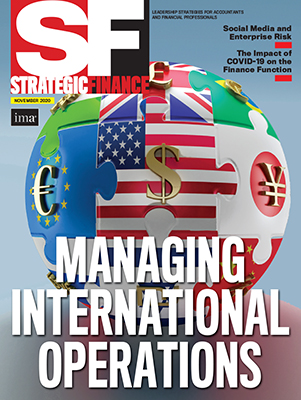Internal Revenue Code §882(a)(1) provides that a foreign entity’s income that’s “effectively connected” to the United States is subject to U.S. income tax. Income tax treaties between the U.S. and other countries often allow foreign entities to avoid U.S. income taxes if no permanent establishment exists in the U.S. Foreign entities that construct buildings or install machinery within the U.S. for their U.S. customers, for example, typically prefer to structure activities in ways that avoid creating permanent establishments. For these foreign entities, COVID-19 can cause negative tax consequences by increasing the likelihood of an unintentional permanent establishment.
PERMANENT ESTABLISHMENTS
The income tax treaty between the U.S. and Germany contains language typical of treaties that allow foreign entities to avoid the U.S. income tax if no U.S. permanent establishment exists. Article 7, Paragraph 1 taxes business profits of an enterprise’s permanent establishment in the U.S. Article 5, Paragraph 3 provides that a permanent establishment doesn’t include a building site or construction, assembly, or installation project that lasts 12 months or less.
The treaty explanation specifies that the 12-month test applies separately to each individual site or project and that the 12-month period begins when work (including preparatory work) physically begins in the contracting country. A series of contracts or projects that are interdependent commercially or geographically are treated as a single project for purposes of the 12-month test. A housing development, for example, would be considered a single project even if each house were constructed for a different purchaser. A project that exceeds 12 months is treated as a permanent establishment.
Having a permanent establishment in the U.S. may also affect employees working there. Article 15 of the U.S. and Germany treaty, for example, provides that employees of a foreign entity who work on projects in the U.S. are taxed by the U.S., and Paragraph 2 provides an exception when no permanent establishment exists for employees who aren’t U.S. residents and who are present in the U.S. for 183 days or less.
The Organisation for Economic Co-operation and Development model treaty addresses disruptions to work and the impact on a permanent establishment but not specifically in the context of a pandemic. Interruptions that occur in the normal course of a project are included in determining the length of the project because such interruptions don’t break the functional relationship of the project with the foreign jurisdiction. This includes seasonal or other temporary interruptions.
EFFECTS OF COVID-19 ON PERMANENT ESTABLISHMENTS
Many construction and installation activities have temporarily or permanently ceased as a result of the COVID-19 outbreak, and some foreign entities find themselves in the unlucky situation of being unable to complete projects within 12 months. Contracts, treaties, and tax laws don’t specifically provide for the possibility of pandemics in the same way they provide for “acts of God.”
The Internal Revenue Service (IRS) recently issued guidance related to COVID-19 in the form of FAQs. A question related to the existence of a permanent establishment may give relief to both employers and employees during the current pandemic. The question concerned a nonresident alien or foreign corporation not otherwise engaged in a U.S. trade or business. The question addressed the treatment of entities conducting business through permanent establishments using individuals temporarily present in the U.S. performing services or activities that wouldn’t have been conducted in the U.S. but for COVID-19 emergency travel disruptions. The IRS responded as follows:
“During an Affected Person’s COVID-19 Emergency Period, services or other activities performed by one or more individuals temporarily present in the United States will not be taken into account to determine whether the nonresident or foreign corporation has a [permanent establishment], provided that the services or other activities of these individuals would not have occurred in the United States but for COVID-19 Emergency Travel Disruptions.”
That is, an individual’s presence in the U.S. that extends beyond 12 months from when a project begins won’t create a permanent establishment if that extended presence is the result of emergency travel disruptions due to COVID-19.
TAX PLANNING FOR COVID-19
The IRS guidance leaves open the question of whether a project that exceeded 12 months as a result of COVID-19 delays would be treated as a permanent establishment. Those delays may not be usual or temporary, but under the available guidance, all the days affected by COVID-19 disruptions may very well count toward the 12-month rule for determining if a foreign entity has a permanent establishment.
If appropriate documentation is in place, however, the IRS’s FAQ response may provide a reasonable basis for treating U.S. activities as failing to create a permanent establishment. The foreign company would need to document that it wouldn’t have had a permanent establishment if it weren’t for the disruptions due to COVID-19. In some cases, this may be possible only after the project is complete and all information is available. For example, a foreign entity might argue that a project that ends after more than 12 months was delayed solely because of COVID-19 and would, otherwise, have been completed within 12 months.
Taxation in the U.S. due to a permanent establishment isn’t always an undesirable outcome. If a foreign entity is taxed at 20% on the profit from a construction or installation project in the U.S. and would otherwise be taxed at 30% in its home country, having a permanent establishment in the U.S. could be a benefit. If the rates are reversed, however, a permanent establishment could be detrimental. In a worst-case scenario, the home country might disagree with the U.S. interpretation of project length, and the entity could have permanent establishments in both countries and be taxed by both countries.
Companies need to explore the possibilities and risks. For instance, one solution to the permanent establishment problems caused by COVID-19 may be to simply cancel or abandon existing projects.
© 2020 A.P. Curatola

November 2020



